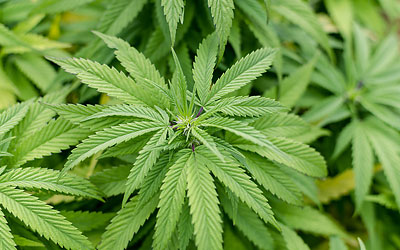Cannabidiol May Benefit Patients With Early Psychosis, Cannabis Misuse
Abstract
There are several possible mechanisms by which CBD may produce clinical benefits for patients with early psychosis, according to a review in Schizophrenia Bulletin.
Cannabidiol (CBD), found in low concentrations in modern strains of cannabis, may have beneficial effects on symptoms of psychosis, counteracting the effects of tetrahydrocannabinol (THC).

THC is the agent in cannabis that causes the “high,” impairs cognition, and can exacerbate psychosis in at-risk individuals.
“CBD may improve the disease trajectory of individuals with early psychosis and comorbid cannabis misuse in particular—a population with currently poor prognostic outcome and no specialized effective intervention,” wrote Britta Hahn, Ph.D., of the Maryland Psychiatric Research Center in a recent review article on the subject in Schizophrenia Bulletin.
The bulk of existing CBD research has been based on laboratory work involving animals or small samples of human patients. “We need large-scale, multi-site clinical trials to get more data on the nature and size of CBD effects, given alone or with other medications; the right dosing; and the clinical populations and symptoms most likely to benefit,” Hahn told Psychiatric News.
CBD is a compound that occurs naturally in cannabis sativa, although it has been progressively bred out of the plant over the past few decades because it counteracts effects of THC and may make the cannabis feel less potent. It can be manufactured synthetically, and GW Pharmaceuticals is in the process of submitting a new drug application for its version of pure CBD (Epidiolex) for infantile seizure syndromes, she noted.
In the Schizophrenia Bulletin paper, Hahn outlined the possible mechanisms by which CBD may produce clinical benefits for patients with early psychosis:
CBD appears to be a partial agonist at dopamine D2 receptors, similar to the antipsychotic aripiprazole, and this may at least in part account for its antipsychotic effects and for its potential reduction of the effects of THC.
CBD has been reported to up-regulate concentrations of the endocannabinoid anandamide by inhibiting its reuptake and degradation. A four-week treatment with CBD increased anandamide serum levels in a small sample of patients with schizophrenia, and this increase was associated with a drop in psychotic symptoms.
Other pharmacological targets of CBD potentially responsible for its clinical benefits include 5-HT1A receptors, which are associated with psychosis; GPR55 cannabinoid receptors; and TrpV1 receptors, which may be associated with cannabis-induced psychosis. There may be other effects of CBD as well.
“Cannabidiol has very subtle subjective effects, if any, but there is increasing evidence that it can reduce symptoms of psychosis and act as an anxiolytic, both of which are relevant for the treatment of schizophrenia,” Hahn said. “In terms of side effects, CBD seems to be very benign, much more so than the current standard-of-care antipsychotics and anxiolytics,” she added.
Even with the promising findings on CBD to date, Hahn cautioned CBD should not be used as an alternative to cannabis use cessation.
Tony P. George, M.D., a professor of psychiatry and director of the division of brain and therapeutics in the department of psychiatry at the University of Toronto, said he is cautiously optimistic about the therapeutic potential of CBD. “Given the high rates of cannabis misuse in early psychosis and its possible antipsychotic, anti-addictive, anti-anxiety, and pro-cognitive effects, there is obvious potential to treat comorbid cannabis use disorder and early psychosis [using CBD],” he said.
“But the data so far are sketchy,” George said. “We need solid clinical trials to test its efficacy and safety for psychosis prevention and treatment in early psychosis patients with and without problematic cannabis use.”
His advice to prescribers? “Stay tuned. It’s a promising idea, but it will be a few years before it is widely available. In the meantime, behavioral interventions like CBT [cognitive-behavioral therapy] and contingency management have a role in treating cannabis use disorder in patients with psychotic disorders.” ■



